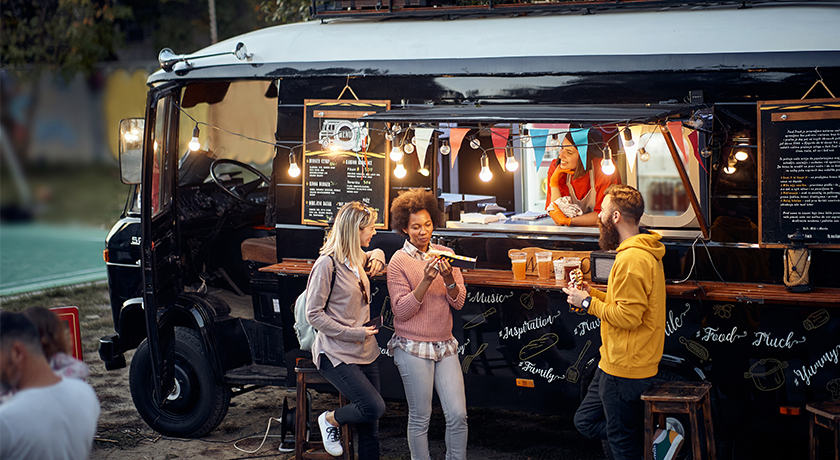There is certainly no denying that the mobile catering business has only grown in popularity over the past few years.
What started as roadside burger vans has now expanded into cocktail bars and gourmet food trucks offering 5* meals on the go. Nowadays at every event we attend, there will be some variation (or three) of food trucks for you to take your pick from.
If you are interested in starting a mobile catering business of your very own, join us as we run down the advantages and disadvantages of owning and running a catering van…
Pros:
Kicking off the list today, let's begin with the advantages of owning your very own mobile catering business (and trust me there are plenty!)

Freedom to be creative
If you’re looking into the option of starting a mobile catering business, then you probably have a passion or at least an interest in food, so the biggest selling point for most is the fact that you can create your own menu. Go wild, get inventive, and use your own creations. Make your secret family recipes famous. You’re the boss so use this freedom to march to the beat of your own drum and develop your own style.
Lower start-up and maintenance costs
Arguably, a mobile catering business’s main strength is the price. Typically, the running costs are low, the prices of dishes are cheaper, and let’s not forget that the actual start-up costs will be lower compared to opening a shop-based restaurant or café.
For more information regarding expenses, read our guide on how much it costs to start a food truck business.
Better opportunities
We all know that being your own boss and making decisions creates ample opportunities. We’ve discovered that you not only get the freedom to create your own menu, but it also grants you the opportunity to change and mix it up whenever you want. So, if there’s seasonal produce you’re dying to use, why not throw it up as a special New food trend circulating TikTok or Instagram? Jump on the bandwagon and reap the rewards!
Alongside this, the opportunity to market your business is large and, in this industry, it’s all about word of mouth. It’s one of the easiest and more importantly, cheapest, ways to get your name and what you’re serving out there because people trust it.
It’s been proven that if you receive a recommendation from a friend or close family member, you’re more likely to explore it rather than just scrolling past an ad on social media. So grab the opportunity and park up in front of a busy office area at lunchtime, go to a popular park, or even attend a music festival and get those people talking about what you have to offer!
Change location whenever you feel like it
The clue is in the name, your business is mobile so it’s easy to take advantage and seize the opportunity of targeting fluctuating levels of business in different areas and even events.
More convenient option
Quick service and the use of disposable packaging and cutlery that’s perfect for ‘getting and going’, it’s a no-nonsense style of catering and an easy way to enjoy good food.

Cons:
The thought of opening up a food truck is exciting, however before you run away with your excitement, it is important to weigh up the disadvantages....
Restricted space
There’s no hiding, (literally), that the space you’ll have to work in will be limited, and when you add in the kitchen equipment and the staff, that space will feel even smaller. Depending on the amount available, you may even have to reduce the amount of staff you originally planned to have working with you.
Whilst this is on the ‘cons’ list, it doesn’t have to be seen as a complete negative, it just means you may need to get creative with how you work.
Your vehicle is your entire business
On the flip side, while it may be the cheaper way to start a new business, the cost of buying the necessary vehicle outright can creep into the four, or even five figures, and if you go for a used catering van, you’ll need to have a budget to cover any repair costs in case anything goes wrong.
God forbid if anything does go wrong, you’ll also need to factor in what you’ll lose whilst your vehicle is off the road.
Tackling parking Restrictions
Whilst you can go anywhere, you can’t park everywhere. Our city streets all have different sets of rules, restrictions, and dreaded zones! Therefore, to ensure you have the correct permits your prospective schedule may need planning in advance.
It’s also worth mentioning that in some areas you’ll have to adhere to the same parking charges as a normal car. It’s recommended that you leave a little money in the budget for potential parking fees and always do your research before setting off.
Increased competition
Unfortunately, the popularity of food trucks ever increasing, which consequently means there will be many more vendors to compete with.
Go to any weekend market or public event and you’ll see for yourself, the competition is fierce. From mac and cheese to sushi bowls and even the return of good ol’ fish and chips, you’ll be battling with cuisines from every corner of the world all trying to get noticed, therefore, thinking outside the box and standing out has never been so important.
Success is not guaranteed
We’ve always known it, but over the last couple of years, we’ve seen just how unpredictable life can be and one thing to remember is that work and income aren’t always guaranteed. Events can be cancelled, and trade can be slow so it’s important to be aware of this and have a contingency plan in place.

The Next Stop: Get Insured!
It’s important to understand the market before diving straight into the deep end. If this is you and you are after more advice, take a read of our How to start a food truck business article.
If you already have your catering van set up, make sure you have the correct insurance. Lexham Insurance offers an exclusive catering van insurance scheme that ensures you have everything you need to get out on the road and sell your goods!
Related article

How much does it cost to start a food truck business?
Discover how much it costs to start a food truck business, from the initial cost of a food truck to...
Read more




